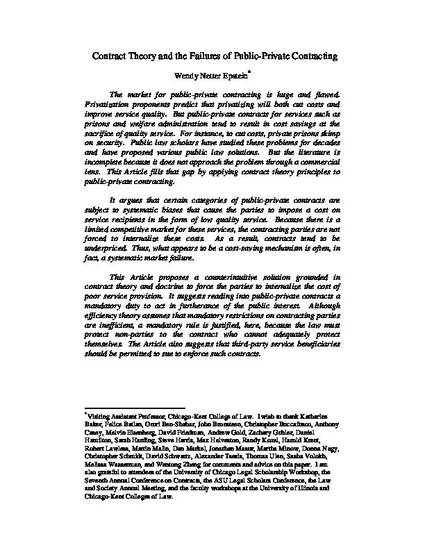
The market for public-private contracting is huge and flawed. Public-private contracts for services such as prisons and welfare administration tend to result in cost savings at the sacrifice of quality service. For instance, to cut costs, private prisons skimp on security. Public law scholars have studied these problems for decades and have proposed various public law solutions. But the literature is incomplete because it does not approach the problem through a commercial lens. This Article fills that gap. It considers how economic analysis of contract law, in particular efficiency theory and agency theory, bear upon the unique problems of public-private contracting.
Public-private contracts are subject to systematic biases that cause the parties to impose a cost on service recipients in the form of low quality service. Because there is essentially no competitive market for these services, the contracting parties are not forced to internalize these costs. As a result, contracts tend to be underpriced. Thus, what appears to be a cost-saving mechanism is often, in fact, a systematic market failure.
This Article proposes two unconventional and counterintuitive solutions to force the parties to internalize the cost of poor service provision. First, it suggests reading into public-private contracts a mandatory duty to act in furtherance of the public interest. Although efficiency theory assumes that mandatory restrictions on contracting parties are inefficient, a mandatory rule is justified, here, because the law must protect non-parties to the contract who cannot adequately protect themselves. Second, this Article argues, based on behavioral economics studies, that these contracts should be less detailed. Although agency theory suggests that detailed tasks, performance incentives, and monitoring mitigate agency costs, those mechanisms do not work with public-private contracts. Studies indicate that less detailed contracts that rely on social norms such as reciprocity may better align incentives.
Available at: http://works.bepress.com/wendy_epstein/3/
